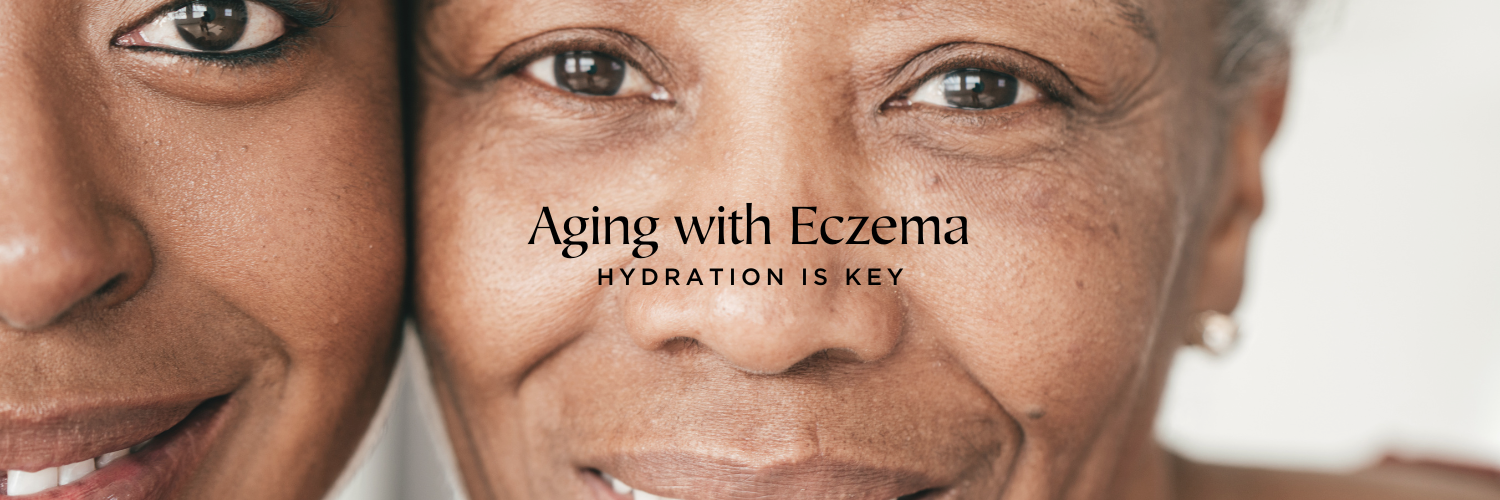
Aging with Eczema
Caring for Aging Skin with Eczema: Nurturing Your Skin's Health
As we age, our bodies undergo a multitude of changes, and our skin is no exception to this natural process. While we often associate eczema with childhood, there's a growing understanding of how it can manifest and evolve in older adults. Research shared by the National Eczema Association has unveiled that eczema prevalence actually begins to rise again after the age of 60. This discovery challenges the common belief that eczema is a childhood ailment. In fact, older adults can experience eczema symptoms just as severely as their younger counterparts.
The Connection Between Aging and Eczema
One notable change that occurs as we age is the gradual loss of moisture from the skin. The levels of lipids, or fats, in the skin start to decrease. These lipids are crucial for maintaining a healthy skin barrier, and their reduction can lead to compromised barrier function. This can also manifest as increased sensitivity, more itching, or more frequent flare-ups. Although the skin barrier naturally becomes less leaky over time, overall, the function of the skin barrier does decline. The good news is that moisturizers containing ceramides could potentially help counteract these changes, offering relief for those prone to eczema flare-ups.
Aging doesn't solely impact the skin barrier; it also brings about shifts in the immune system. The regulation of the immune system can become skewed over time. This altered immune response can lean towards hyperactivity, promoting inflammation—a hallmark of eczema. Our hormone production levels also change. Fluctuations in estrogen and testosterone levels can manifest in the feeling of skin drying out. When caring for skin that’s acting up in the older years, it’s extra important to look at the big picture. Annual health exams that include a blood test can shed light on your body’s overall condition. Sometimes, a sudden change in your skin is a sign to go to your doctor and get a check-up.
If you notice some changes happening as you age, here are some steps to consider when caring for aging skin affected by eczema.
Hydration is Key. Given the natural tendency of aging skin to become drier, maintaining proper hydration is essential. Regularly apply moisturizers with ceramides to bolster the skin's lipid barrier and prevent excessive moisture loss. Opt for fragrance-free and hypoallergenic products to minimize the risk of irritation. Applying moisturizers immediately after bathing (when the skin is slightly damp) can help lock in moisture effectively.
Be Gentler During Cleansing. While maintaining cleanliness is important, avoid harsh soaps and aggressive scrubbing. Instead, opt for mild, fragrance-free cleansers that won't strip the skin of its natural oils. Long, hot showers should be minimized, as they can further contribute to skin dryness.
Consideration of Food or Sleep. Eating everything indiscrimately—whether that’s rich foods, lots of caffeine, or copious amounts of alcohol—may no longer be sustainable. Maintaining a balanced diet rich in antioxidants, vitamins, and omega-3 fatty acids is important for skin health. These nutrients help support the skin's barrier function and reduce inflammation. Furthermore, our responsibilities pile up over the years. We may have effective stress management techniques that have worked over the decades to keep major breakdowns at bay, but the coping strategies might be hiding a deep and intense need for more rest. Sometimes, it’s important to take a step back and evaluate just how your life is structured, and re-prioritize sleep so that your body can repair itself during those hours of shut-eye.
Shield Your Skin. With aging, our skin no longer has the luxury of returning to its healthy state in 24 hours. Shield your skin from harsh weather conditions, particularly during winter when dryness tends to intensify. Use gloves and scarves to protect your hands and neck from cold wind and low humidity.
We are not just interested in helping skin that’s already youthful. At Sade Baron, we create formulas that work for everyone, every skin type, and every age. If you’re feeling dry and don’t know where to start, try Bond, our bestselling all over body salve. It’s beloved for its ability to deeply nourish, with lasting results. With oat oil, kokum butter and calendula oil, the formula feeds a vulnerable skin barrier with nutrients, giving your skin a chance to heal itself.
Sources:
National Eczema Association. (2022, January 12). Eczema and Aging [Video]. YouTube. https://youtu.be/eaangVNVxWo
